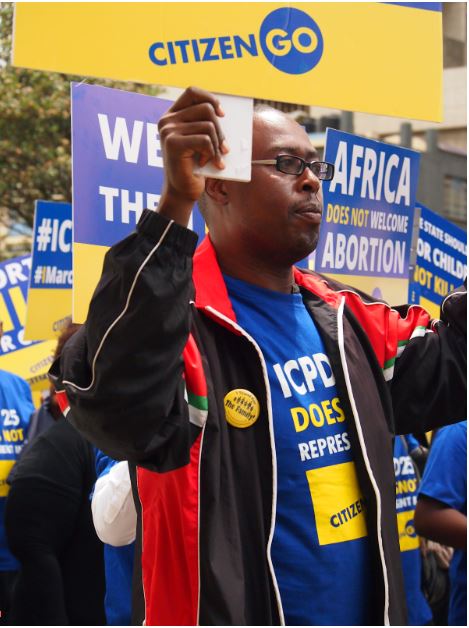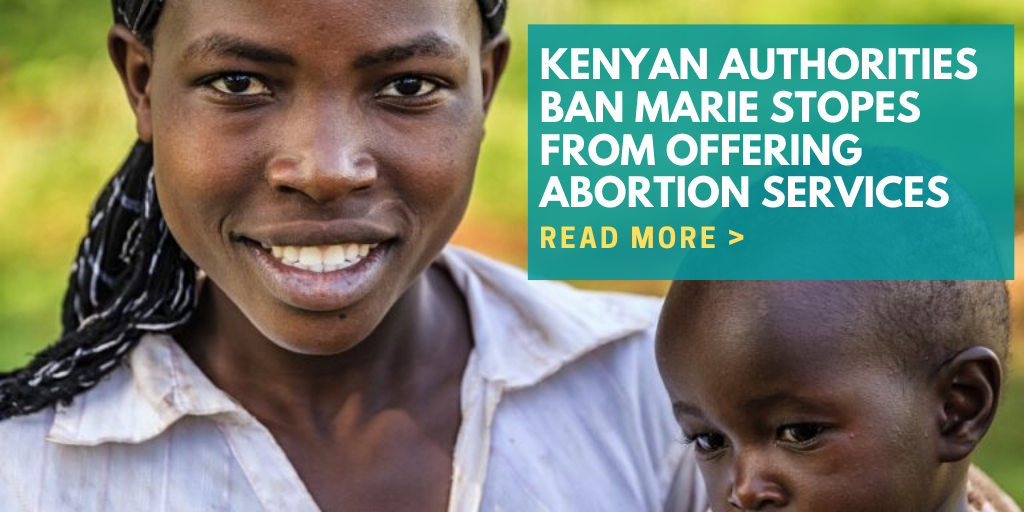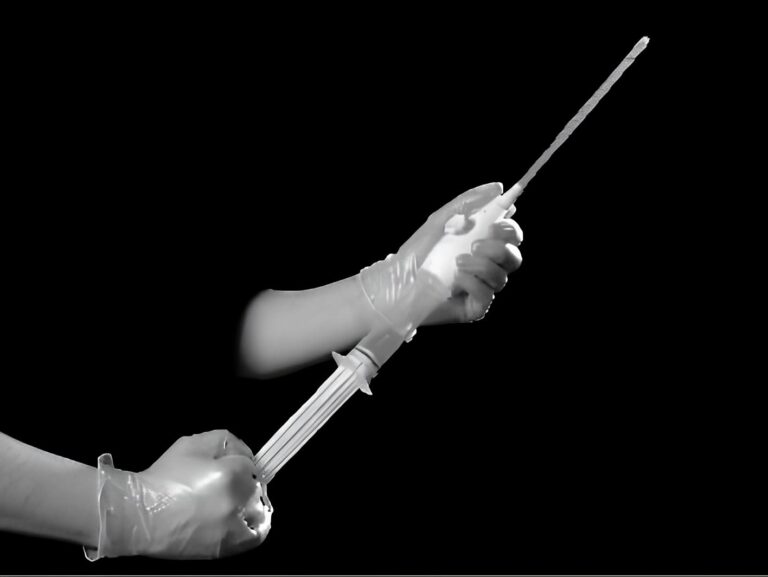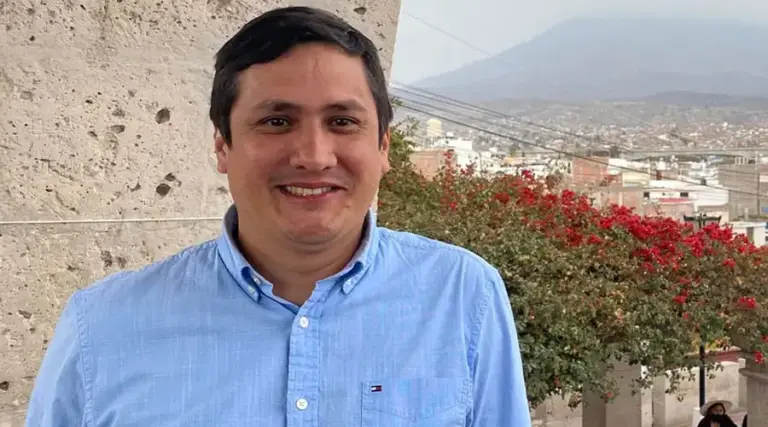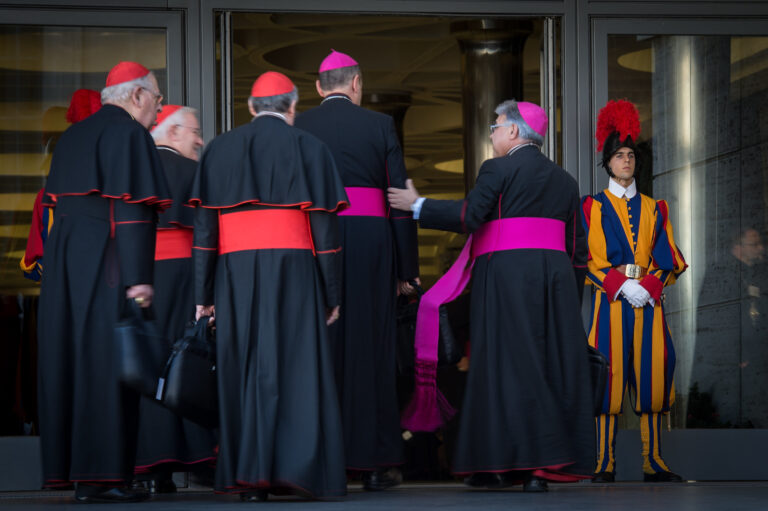Editor’s Note: PRI researcher Jonathan Abbamonte traveled with the PRI delegation to the pro-life and pro-family side event to the Nairobi Summit on ICPD25 organized by KCPF, KCCB, NCCK, CUEA, and EAK. At the pro-life side event, he presented on the facts on population and development to help counter the narrative promoted by population alarmists. He also spoke on how abortion is being promoted at the Nairobi Summit on ICPD25 and how pro-life advocates can utilize internationally-negotiated agreements to push back against abortion advocacy at the U.N. He also attended UNFPA’s Nairobi Summit on ICPD25. This is his report of the events that took place in Nairobi surrounding the ICPD25 summit.
International agreements long ago carefully negotiated by nation states are being hijacked by activists to promote radical pro-abortion and anti-family ideologies. Backed by a handful of wealthy European and Western nations, philanthropists and corporations, a small cabal of well-funded activists operating through the United Nations system is pushing for a narrow set of progressive views that are anathema to the cultural and religious values held by most of the developing world.
The recently concluded Nairobi Summit, convened on the 25th anniversary of the International Conference of Population and Development (ICPD25), is the clearest example of this kind of ideological colonization in recent memory.
Twenty-five years ago, representatives from 179 governments met in Cairo, Egypt at the International Conference on Population and Development (ICPD). At the Cairo conference, UN Member States agreed to what is called “The ICPD Programme of Action.” This is a consensus document in which the nations of the world committed to respecting human rights, women’s rights, and national sovereignty in the areas of population policy, family planning, and reproductive health.
Every five years since the adoption of the ICPD Programme of Action, the United Nations has held follow-up conferences to review the progress of the goals set forth in the Programme of Action. This latest conference, held in Nairobi to mark the 25th anniversary of the ICPD Programme of Action, was different. Co-hosted by United Nations Population Fund (UNFPA), the Government of Denmark, and the Government of Kenya, the ICPD25 Nairobi Summit was convened from November 12-14, 2019 to “galvanize partnerships and spur political and financial commitments to urgently complete the unfinished business of the landmark ICPD Programme of Action.”
What exactly did the conference conveners claim was the “unfinished business” of the ICPD Programme of Action? Imposing on the developing world the sexual revolution that has devastated Western Europe and large parts of the United States, it turns out.
Among the goals set forth by the conference were deeply controversial agenda items: the promotion of the universal acceptance of birth control, graphic comprehensive sex education (CSE), acceptance of various forms of “sexual orientation and gender identity or expression,” and abortion.
Other “unfinished business” was the incorporation of “sexual and reproductive health” as a core component of universal health coverage and as integral in humanitarian and fragile contexts. The 1994 ICPD Programme of Action defined abortion as a component of reproductive health in “circumstances where abortion is not against the law.” As a result, the use of the term “reproductive health” in U.N. forums carries an abortion connotation.
The conference also sought to advance the term “sexual and reproductive health and rights” (SRHR). This is a term never agreed to by the international community and one which can be interpreted to imply that adolescents have a right to sexual relations and that gay marriage should be legalized. The ICPD Programme of Action recognized the somewhat cumbersome term “sexual and reproductive health and reproductive rights.” The term “sexual rights,” however, has never been recognized by the international community and is not found in any negotiated agreement.
Opposition to the Summit in Kenya
The “unfinished business” of the Nairobi Summit stirred considerable controversy in the host country of Kenya. The organizers had originally scheduled a presentation at the Kenyan Parliament, but Kenyan lawmakers, wary of the many controversial items on the agenda, blocked them from coming.
“If it is coming out clear that these people are most likely coming to discuss something we don’t agree to as a country…the next question you want to ask is why allow them to come?” John Mbadi, Minority Leader of Kenya’s lower house of Parliament, said on the floor of the National Assembly according to NTV.
Opposition to ICPD25 was bipartisan. On the other side of the political aisle, Aden Duale, Majority Leader of the National Assembly, expressed similar sentiments. “When you come to people’s homes, you must respect their culture,” Duale said.
In fact, the controversy surrounding ICPD25 was so intense that Kenya President Uhuru Kenyatta went on national television ahead of the summit to make clear that his administration would not accept anything from the summit that went against African values and beliefs.
Religious leaders in Kenya also came out strongly against the ICPD25 agenda, condemning it for promoting topics such as birth control, abortion, graphic sex education, and homosexuality that were contrary to Christian morals.
“We do not believe that these are the issues that truly concern the development of women and humanity at large,” said Most Rev. Philip Anyolo, Archbishop of Kisumu and Chairman of the Kenya Conference of Catholic Bishops, according to Kenya CitizenTV. “We view this agenda as an intent to corrupt our young people and enslave them to foreign ideologies.”
Blocking Out Pro-Life and Pro-Family Voices
Considerable secrecy surrounded the lead up to the summit. While most U.N. conferences encourage participation from civil society organizations with a diverse range of opinions, pro-family and pro-life organizations seeking to register the ICPD25 Summit were systematically denied accreditation.
Initially, only two conservative organizations were granted access to the conference. Shortly before the conference began a third was also approved. I myself, representing the Population Research Institute (PRI), was only granted accreditation after the conference began.
The website for the Nairobi Summit had instructed applicants to check their spam boxes and contact the registration team if they did not get an email saying their application had been approved. For pro-life and pro-family organizations, including those with consultative status with the United Nations, weeks and months passed with no response from the ICPD25 registration team. Spam boxes went empty and follow-up emails went unanswered.
“There’s a limit to how many participants can attend a conference,” said Arthur Erken, Director of the Division of Communications and Strategic Partnerships at UNFPA and Co-Chair of the International Steering Committee for the ICPD25 Summit, in an interview with Kenya CitizenTV, “and of course we want to make sure that there is [sic], that not one group dominates over the next.”
But the domination of one particular set of views on sexuality and abortion was precisely what occurred at the ICPD25 Summit. Pro-life and pro-family voices were shut out. None of the speakers invited to the summit provided a religious-conservative perspective. Not one promoted traditional family values or pro-life principles.
On the contrary, many of the speakers were leaders of prominent left-wing fringe organizations that advocate for the legalization of abortion. These included the International Planned Parenthood Federation, Marie Stopes International, Ipas (the manufacturer of the manual abortion aspiration device), the Center for Reproductive Rights (a legal advocacy organization that agitates for the legalization of abortion worldwide), Women Deliver, the International Campaign for Women’s Right to Safe Abortion, and SheDecides (an international abortion fund set up to counteract President Turmp’s Protecting Life in Global Health Assistance policy which bars global health funding to foreign NGOs that perform or promote abortion).
The final conference statement issued by the organizers of the ICPD25 summit was tightly controlled by the conference’s steering committee. Typically, outcome documents from U.N. conferences are carefully debated and member states are allowed to negotiate its contents. The final outcome document from a U.N. conference usually represents the consensus of states and input is taken from all member states. Instead, statement of the ICPD25 Summit was already drafted before the conference even began, and instead of representing the consensus of states with input taken from all member states, only a small number of states were ever consulted.
Promotion of Abortion at the Summit
The final outcome statement of the conference, the Nairobi Statement on ICPD25, was clear in its promotion of abortion. Objective no. 3 states that governments should aim to reach zero preventable maternal deaths by “integrating a comprehensive package of sexual and reproductive health interventions, including access to safe abortion to the full extent of the law.” Objective no. 12 seeks to make abortion an integral component of humanitarian aid by “ensuring that the basic humanitarian needs…are addressed…through the provision of access to comprehensive sexual and reproductive health information, education and services, including access to safe abortion services to the full extent of the law.”
This marks a stark departure from the 1994 ICPD Programme of Action accepted by 179 nations at Cairo, which made clear that “In no case should abortion be promoted as a method of family planning” and that “Any measures or changes related to abortion within the health system can only be determined at the national or local level according to the national legislative process.” That is to say, the legal status of abortion is up to independent states to decide for themselves without outside pressure or interference from the foreign elements.
According to the ICPD25 summit website, the final statement of the Nairobi Summit does not call on countries to legalize abortion. And while this is true according to a literal reading of the text, the drafters of the Nairobi Statement clearly intended to promote abortion to the furthest extent possible, calling on states to provide abortion services “to the full extent of the law” and as an integral part “sexual and reproductive health.” Nowhere in the 1994 ICPD Programme of Action are states called upon to provide abortion “to the full extent of the law.” This novel phrase represents nothing more than an attempt to reinterpret the Programme of Action to favor abortion.
Finally, even if the Nairobi Statement does not call on nations to legalize abortion, many of the conference’s prominently highlighted speakers never got the memo. For example, at the closing plenary event of the summit, one of the speakers was Naisola Likimani, with the pro-abortion group SheDecides.
“I have to mention abortion,” Likimani said, “If there is one thing this summit has done is taken the elephant in the room and put it squarely on the table…The time is now. We will not reach zero preventable maternal deaths and injuries if we do not address the need for safe and legal abortion services.”
Also hammering away on abortion was the Hon. Karen Elleman, Danish Member of Parliament for the Liberal Party and Chairwoman of the All-Party Parliamentarian Group on Sexual and Reproductive Health and Rights. Speaking on behalf of the Danish government, one of the three principal co-sponsors of the ICPD25 Summit, Elleman made clear that the government of Denmark will not only promote abortion worldwide but will also oppose anyone who works to protect the right to life for the unborn.
“I find it very hard to understand how anyone can be against the right to decide over your own body, your own life, your own future,” Elleman said, “Let me mention one example. The push-back on providing access to health services such as safe abortion.”
“Denmark will do its part to make sure that this does not happen. That the fight for women’s sexual and reproductive health and rights continues. That push-back is being pushed back,” Elleman concluded to thunderous applause.
Participants at ICPD25 were encouraged to pledge to make progress on any of the twelve objectives laid out in the final statement. In this context, several governments and NGOs publicly promised to lobby for the legalization of abortion in foreign countries.
Sweden, for instance, pledged “to emphasise SRHR for all,” specifying that “Important elements include access to quality comprehensive sexuality education and safe and legal abortion.”
Other countries committed to increasing access to abortion within their borders. The commitment from the government of Nepal stated that it would seek to reduce the number of maternal deaths not only by increasing the percentage of attended births, but also through “the provision of legal abortion and post-abortion services that are safe, accessible, affordable and good quality.”
The left-wing government of Mexico committed to “ensure women’s access to emergency contraception and abortion services and care that respects their dignity without prejudice in 100% of public health institutions by 2024.” This pledge was made despite the fact that abortion in Mexico is currently illegal under most circumstances, except in Mexico City and the Mexican state of Oaxaca.
Several pro-abortion NGOs also committed to lobbying for the legalization of abortion. The International Campaign for Women’s Right to Safe Abortion promised to campaign for the “decrminialization of abortion,” for “Universal access to safe abortion in every country,” and for the availability of abortion on demand.
Not to be outdone, the International Planned Parenthood Federation included actual targets in its pledge. “We will influence 20 governments to establish new or revised policy initiatives or to pass legislative changes in support of improved access to abortion,” stated IPPF. “By 2022, IPPF will accelerate universal access to safe abortion.” Marie Stopes International also said that it would work with governments to “remove restrictions and increase access” to abortion.

In protest of the anti-life and anti-family objectives being promoted at the summit, the United States delegation to the ICPD25 Summit, along with 10 other nations including Brazil, Belarus, Egypt, Haiti, Hungary, Libya, Poland, Senegal, St. Lucia, and Uganda, issued a joint statement officially denouncing sex education without parental participation and the promotion of abortion. Valerie Huber, Senior Policy Advisor at the U.S. Department of Health and Human Services (HHS) Office of Global Affairs and part of the U.S. delegation to the Nairobi Summit on ICPD25 read the statement, which affirms “[t]here is no international right to abortion.”
The joint statement also criticized the lack of transparency at the conference: “[O]utcomes from this summit are not intergovernmentally negotiated, nor are they the result of a consensus process. As a result, they should not be considered normative, nor should they appear in future documents as intergovernmentally agreed language.”
Pro-life and Pro-Family Voices Mobilize
In response to the anti-family agenda being promoted at UNFPA’s ICPD25 Nairobi Summit, a counter conference was convened by the Kenya Christian Professionals Forum (KCPF), the Kenya Conference of Catholic Bishops (KCCB), the National Council of Churches Kenya (NCCK), the Catholic University of Eastern Africa, and the Evangelical Alliance of Kenya (EAK) across the street from where the summit was being held.
“The sexual and reproductive health and rights agenda that UNFPA is pushing is alien to African culture,” says Richard Kakeeto, OFS, Lecturer of Justice and Peace at the Catholic University of Eastern Africa and lead organizer of the pro-life side event.
“Africa affirms morals and modesty,” Kakeeto told PRI, “the SRHR agenda is converting everything that Africans have hitherto defined as immoral into human rights. The African Charter of the Rights and Welfare of the Child grants children not only rights but responsibilities within the care of their parents. The UNFPA agenda is taking all this away and denying parents a stake in the [] raising of their children.”
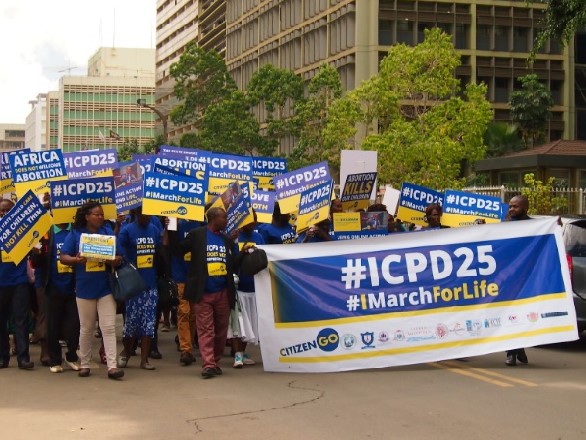
On the opening day of the ICPD25 summit, pro-life and pro-family Kenyans marched through downtown Nairobi in protest of the UNFPA summit where they hand-delivered a petition with 87,000 signatures to the office of president of Kenya telling President Kenyatta that the ICPD “does not represent me.”
“All that UNFPA did was raise lots of money for its agenda but not legitimacy,” Kakeeto said, “The pro-life and pro-family side events succeeded in denting the legitimacy of the ICPD25.”

